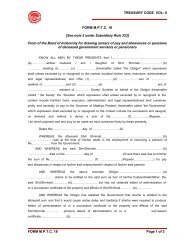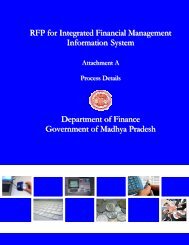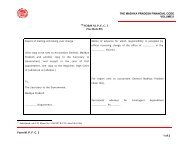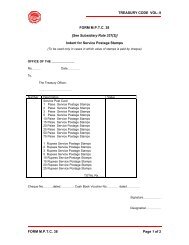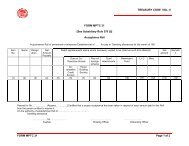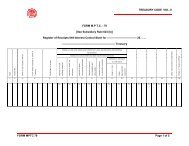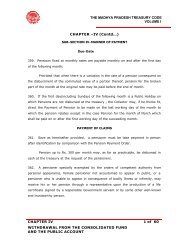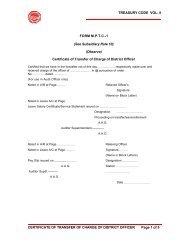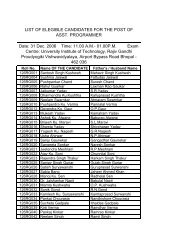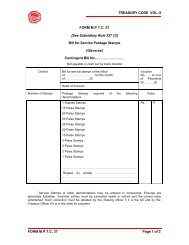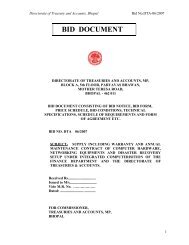THE MADHYA PRADESH FINANCIAL CODE ... - Mptreasury.org
THE MADHYA PRADESH FINANCIAL CODE ... - Mptreasury.org
THE MADHYA PRADESH FINANCIAL CODE ... - Mptreasury.org
You also want an ePaper? Increase the reach of your titles
YUMPU automatically turns print PDFs into web optimized ePapers that Google loves.
<strong>THE</strong> <strong>MADHYA</strong> <strong>PRADESH</strong> <strong>FINANCIAL</strong> <strong>CODE</strong><br />
VOLUME I<br />
CHAPTER 6 – CONTINGENCIES<br />
Section I – Introductory<br />
10. The rules in this Chapter are supplementary to the general rules of procedure<br />
prescribed in Section V of Chapter Iv of the Madhya Pradesh Treasury Code,<br />
Volume I, and have to be applied, where necessary, in conjunction with them.<br />
11. The orders relating to the supply of articles for the public service are contained<br />
in the Store Rules in Appendix 5; and miscellaneous rules regarding contingent<br />
expenditure on certain other objects are given in Appendix 6.<br />
12. Special rules applicable to particular departments are contained in the Manuals,<br />
Code, etc., of the departments concerned.<br />
13. The term ‘Contingencies’ covers all incidental or other expenses, which are<br />
incurred for the management of an office as an office or for the technical<br />
working of the department. Expenditure on contingencies is classified in the<br />
budget mainly under the following standard objects of expenditure or units of<br />
appropriation –<br />
(i) Wages.<br />
(ii) Office expenses.<br />
(iii) Payment for professional services.<br />
(iv) Rents, Rates and Taxes.<br />
(v) Publications.<br />
(vi) Advertising, Sales and Publicity expenses.<br />
(vii) Hospitality expenses.<br />
(viii) Secret service expenditure.<br />
(ix) Maintenance.<br />
(x) Motor vehicles.<br />
(xi) Other charge.<br />
The different classes into which the contingent charges classified under<br />
the above units are further divided, incurred on public service and<br />
conditions governing them are laid down in Section V of Chapter Iv of<br />
the M.P. Treasury Code, Volume I. The classification to be adopted in<br />
each department or office is regulated by general or special orders of<br />
Chapter 6 Contingencies 1 of 11
<strong>THE</strong> <strong>MADHYA</strong> <strong>PRADESH</strong> <strong>FINANCIAL</strong> <strong>CODE</strong><br />
VOLUME I<br />
Government. Appendix 7 contains a list of classification of contingent<br />
charges of various departments.<br />
14. Contingent charges are to be recorded and treated in the accounts as charges of<br />
the month in which they are actually disbursed from treasury.<br />
Section II – Powers of subordinate authorities to Sanction<br />
Contingent Charges<br />
15. (1) The Financial powers of subordinate authorities to sanction contingent<br />
expenditure are regulated generally by the orders embodied in Book of Financial<br />
Powers 1938 Vol. I and by such other general or special orders as may be issued<br />
by Government in this behalf.<br />
(2) With the exception of the charges mentioned in sub paragraph (3)<br />
below all contingent charges may be incurred on the authority of the<br />
head of the department.<br />
Note 1 – Such authorities as have not been delegated separately greater<br />
powers, on any part icular or items of contingent expenditure by special<br />
orders of Government will exercise only those powers which have been<br />
vested in them under sub rule 100 (1) of the Madhya Pradesh Financial<br />
Code, Volume I.<br />
Note 2 – In the case of the Madhya Pradesh Secretariat the Chief<br />
Secretary is declared as Head of the Department with the Chief Accounts<br />
Officer as the drawing and disbursing officer in respect of pay and<br />
allowances of the Secretariat establishment (both class III & class IV<br />
Government servants) and contingent expenditure in respect of both<br />
‘Secretariat’ and ‘Ministers’ Subject to items given below have further<br />
been delegated as under –<br />
(a) The Chief Accounts<br />
Officer, Madhya Pradesh<br />
Secretariat.<br />
(i) Service postage stamps.<br />
(ii) Charges for electricity and water.<br />
(iii) Charges on account of<br />
telephones.<br />
(iv) Municipal taxes.<br />
(v) Charges for postage, telegrams<br />
phonograms M.O. commission,<br />
Chapter 6 Contingencies 2 of 11
<strong>THE</strong> <strong>MADHYA</strong> <strong>PRADESH</strong> <strong>FINANCIAL</strong> <strong>CODE</strong><br />
VOLUME I<br />
bank draft, commission<br />
(b) The Under Secretary,<br />
G.A.D. (Superintendence)<br />
(c) The Deputy Secretary,<br />
G.A.D. Incharge Secretariat<br />
establishment<br />
(d) The Secretary / Special /<br />
Secretary, G.A.D. Incharge<br />
Secretariat establishment<br />
(vi)<br />
On items other than those<br />
mentioned above but not<br />
exceeding Rs. 500 on any single<br />
item.<br />
On items other than those<br />
mentioned in (a) above but<br />
not exceeding Rs 1000 on<br />
any single item.<br />
On items other than those<br />
mentioned in (a) above<br />
exceeding Rs. 500 but not<br />
exceeding Rs. 10000 on any<br />
single item.<br />
On items other than those<br />
mentioned in (a) above<br />
exceeding Rs. 10000 but not<br />
exceeding Rs. 25000 on any<br />
single item.<br />
The Chief Accounts Officer will be the drawing and disbursing officer for<br />
all this expenditure and a certificate to the effect that necessary sanction<br />
for incurring the same has been duly obtained will be furnished by him<br />
on all such bills claiming the charges. The charges of special or unusual<br />
nature will be incurred after they are duly sanctioned by the State<br />
Government.<br />
(3) (a) The following charges in all cases require the previous sanction of<br />
the Government -<br />
(1) Charges on account of installation of telephone and telephone rent.<br />
(2) Creation of posts of class Iv servants paid from contingencies.<br />
(b) The following charge require the previous sanction of the<br />
Government except in so far as power has been delegated to subordinate<br />
authorities in the rules quoted against each -<br />
Purchase of furniture, instruments and Paragraph 28<br />
Chapter 6 Contingencies 3 of 11
<strong>THE</strong> <strong>MADHYA</strong> <strong>PRADESH</strong> <strong>FINANCIAL</strong> <strong>CODE</strong><br />
VOLUME I<br />
(i)<br />
(ii)<br />
survey appliances exceeding Rs. 500<br />
Appendix 6.<br />
in value far each article<br />
Madhya<br />
Pradesh<br />
Financial<br />
Code, Volume<br />
II<br />
Rent of buildings occupied for public<br />
Paragraph 60<br />
purposes.<br />
Appendix 6,<br />
Madhya<br />
Pradesh<br />
Financial<br />
Code, Volume<br />
II.<br />
Purchase of tents Paragraph 7<br />
(ii) Appendix<br />
6. Madhya<br />
Pradesh<br />
Financial<br />
Code. Volume<br />
II.<br />
(4) Subject as aforesaid, the head of an office may incur or sanction<br />
expenditure on contingencies within the amount of appropriation placed<br />
at his disposal for the purposes, provided that -<br />
in cases where any special rule, restriction, limit or scale has been<br />
prescribed by competent authority regarding particular items of class<br />
of contingent expenditure, it should be strictly observed.<br />
Note – Special rules, restrictions, etc., prescribed by Government<br />
regarding individual items of contingencies are laid down in Appendix 6.<br />
Contingent expenditure of an unusual character or involving departure<br />
from any general or special rule or order made by Government should<br />
not be incurred, nor should any liability be undertaken in connection<br />
therewith, without the previous sanction of Government.<br />
(5) in respect of contract contingent charges for which a lump sum is<br />
placed annually at the disposal of a disbursing officer, no formal sanction<br />
Chapter 6 Contingencies 4 of 11
<strong>THE</strong> <strong>MADHYA</strong> <strong>PRADESH</strong> <strong>FINANCIAL</strong> <strong>CODE</strong><br />
VOLUME I<br />
will be required for expenditure incurred within the annual allotment,<br />
except in so far as the authority fixing the contract allotment issues<br />
direction to the contrary.<br />
(6) The head of an office may authorise any gazetted Government<br />
servant serving under him to incur expenditure under sub paragraph (1)<br />
above, subject to the conditions specified in Subsidiary Rule 125 of the<br />
Madhya Pradesh Treasury Code, Volume I.<br />
16. In the case of special contingent charges for which the sanction of superior<br />
authority is necessary for incurring them, if the sanctioning authority finds it<br />
more convenient to accord his sanction by countersigning the bill in which the<br />
charge in question is include instead of forwarding a copy of his orders<br />
sanctioning the expenditure to the Accountant General, there is no objection to<br />
his doing so, and a separate sanction, will not, in such cases, be insisted upon<br />
by the Accountant General.<br />
Section III – Permanent Advances<br />
17. Permanent advances may be granted to officers who may have to make<br />
payments before they can place themselves in funds by drawing on the treasury.<br />
Examination of the account of these advances should be make by the controlling<br />
authorities whenever an office is inspected. They are subject to the following<br />
rules –<br />
(i)<br />
(ii)<br />
(iii)<br />
The amount of the advance will be fixed by Government except in cases<br />
falling under clause (ii).<br />
Heads of departments may sanction the grant of permanent advances for<br />
offices subordinate to them, p to the amount advised by the Accountant<br />
General as appropriate. The permanent advances for offices of heads of<br />
departments must, however, be sanctioned by the next superior<br />
administrative authority or the State Government.<br />
Note – Permanent Advance should be drawn from the head “872-<br />
Permanent Cash Imprest”.<br />
Applications for the grant or revision of a permanent advance must be<br />
submitted to the sanctioning authority through the Accountant General<br />
who will advise as to the appropriate amount of the advance. In case<br />
falling under clause (ii) above, if there is any difference of opinion<br />
Chapter 6 Contingencies 5 of 11
<strong>THE</strong> <strong>MADHYA</strong> <strong>PRADESH</strong> <strong>FINANCIAL</strong> <strong>CODE</strong><br />
VOLUME I<br />
between the accountant General and the sanctioning authority on this<br />
point, the matter should be referred for the orders of Government.<br />
Note – The application for permanent advance should be accompanied<br />
by a statement showing month by month for the preceding twelve<br />
months the amounts of contingent bill cashed with classified details of<br />
items of expenditure.<br />
(iv) As these advance involve the permanent retention of money outside the<br />
treasury they must not be larger than is absolutely essential.<br />
(v) These advances should not be multiplied unnecessarily. An officer’s<br />
advance should meet the needs of every branch of his office. If he has<br />
subordinates who require petty sums have should rather spare a small<br />
portion of his own advance for their use than apply for separate advances<br />
for them, taking acknowledgements from them in the same way as he<br />
himself furnishes acknowledgements to the Accountant General and<br />
retaining them in his office.<br />
(vi) The advance in intended to provide, on the responsibility of the officer<br />
entrusted with it, for emergent petty advances of all kinds, though it is<br />
seldom that they will be needed for other than contingent charges; thus,<br />
if a Class IV servant is required to travel by rail, his fare must sometimes<br />
necessarily be advanced from this amount.<br />
(vii) In the case of transfer of charges and yearly on the 15th April, each<br />
officer holding a permanent advance must send an acknowledgement to<br />
the Accountant General for the amount due from and accountable for by<br />
himself as on the 31st March preceding. If this be not received, the<br />
Accountant General must demand it immediately. The acknowledgment<br />
should be sent in Form M.P.F.C.8.<br />
(viii) The holder of a permanent advance or an imprest is responsible for the<br />
safe custody of the money placed in his hands, and he must at all times<br />
be ready to produce the total amount of the money in vouchers or in<br />
cash.<br />
Note 1 – The cost of service books required for office establishment<br />
should be met, in the first instance, from for permanent advance of the<br />
office concerned the permanent advance being. Subsequently recouped<br />
Chapter 6 Contingencies 6 of 11
<strong>THE</strong> <strong>MADHYA</strong> <strong>PRADESH</strong> <strong>FINANCIAL</strong> <strong>CODE</strong><br />
VOLUME I<br />
from the amount realized by the sale of the books to Government<br />
servants.<br />
Note 2 – Advances of travelling allowance on tour may be given to class<br />
IV servants employed in Divisional and Sub divisional offices of the Public<br />
Works Department from the drawing account of the offices and treated<br />
as temporary advances.<br />
Note 3 – Advances of travelling allowance on tour may be given to all the<br />
Government servants of the Madhya Pradesh Secretarial and Vidhan<br />
Sabha Secretariat out of the permanent advance in those cases only in<br />
which the officials whose pay is drawn on establishment pay bile are<br />
required to proceed on tour on a short notice and it is not possible to<br />
draw the advance in time from the treasury.<br />
18. In the case of a district officer, whose permanent advance has to meet the<br />
disbursements of several departments, the contingent abstract of one<br />
department will not be as large as the total permanent advance; but on the last<br />
day of the month, and whenever charge of the office is transferred in the course<br />
of the month, the contingent abstracts of all the departments, should be<br />
submitted at the same time in accordance with Subsidiary Rule 301 of the<br />
Madhya Pradesh Treasury Code, Volume I. Except under these circumstances it<br />
is not desirable that contingent abstracts should be made out for those<br />
departments in which there has been but little expenditure every time the<br />
permanent advance runs low.<br />
Retrenchments should not, under any circumstances, be made good<br />
from the permanent advance, pending appeal or further reference as to<br />
their validity.<br />
Section Iv – Control of Contingent<br />
Expenditure<br />
19. For purposes of control and audit, Government will issue orders specifying the<br />
nature or object of contingent charges of particular disbursing officers which<br />
should e classed as countersigned contingent charges to be drawn and accounted<br />
for in accordance with the procedure prescribed in Subsidiary Rules 313 et seq of<br />
Madhya Pradesh Treasury Code, Volume I.<br />
Chapter 6 Contingencies 7 of 11
<strong>THE</strong> <strong>MADHYA</strong> <strong>PRADESH</strong> <strong>FINANCIAL</strong> <strong>CODE</strong><br />
VOLUME I<br />
Expenditure incurred by a disbursing officer on objects classed as<br />
countersigned contingencies must come under the direct supervision and<br />
scrutiny of the head of the department or the controlling officer who will<br />
sign the detailed bills relating to them. Monthly detailed bills in respect<br />
of countersigned contingent charges incurred by each officer should be<br />
submitted to the controlling authority concerned, for detailed scrutiny an<br />
transmission after countersignature to the Accountant General. Full<br />
details of such charges need not be entered in the abstract bills present<br />
for payment at the treasury.<br />
A competent authority may in respect of specified items of countersigned<br />
contingent charges require the abstract contingent bills to be sent to the<br />
controlling authority for scrutiny and countersignature before it is<br />
presented for payment at the treasury.<br />
Note – The provision of the rule do not apply to contingent charges of<br />
the offices of heads of departments and those of other office mentioned<br />
in note below Subsidiary Rule 308 of the Madhya Pradesh Treasury Code,<br />
Volume I, which will be drawn and accounted for in accordance with the<br />
procedure laid down in the following rules.<br />
20. No detailed bills need be submitted to a higher authority for contingent charges,<br />
which are not classed as countersigned contingencies, each bill presented at a<br />
treasury should, therefore, contain full details of the expenditure, supported by<br />
necessary sub vouchers for individual payments included in the bill.<br />
21. The duties and responsibilities of disbursing and controlling officers with regard<br />
to contingent expenditure incurred on the public service are defined in<br />
Subsidiary Rules 290 to 293 of the Madhya Pradesh Treasury Code, Volume I.<br />
The head of each department should issue such subsidiary instructions as may<br />
be necessary for the guidance of controlling and disbursing officers subordinate<br />
to him.<br />
22. Detailed instructions as to the general procedure for the control of expenditure<br />
against appropriation are contained in Chapter 15. The following special<br />
instructions are laid down for the control of contingent expenditure –<br />
(i)<br />
Where the appropriation for contingent charges covers expenditure on a<br />
number of distinct and individually important objects or class controlling<br />
authority among the important items comprised in it. If some of the items<br />
Chapter 6 Contingencies 8 of 11
<strong>THE</strong> <strong>MADHYA</strong> <strong>PRADESH</strong> <strong>FINANCIAL</strong> <strong>CODE</strong><br />
VOLUME I<br />
are not important; those items taken as a whole may be treated as a<br />
single important item for this purpose. The expenditure on each<br />
important item should be watched and controlled separately against the<br />
allotment for it, especially when the charges are of a fluctuating nature.<br />
The contingent register prescribed in Subsidiary Rule 297 of the Madhya<br />
Pradesh Treasury code, Volume I, should be sod designed that this can<br />
be done conveniently.<br />
(ii)<br />
(iii)<br />
Four countersigned contingencies, the monthly detailed bills provide all<br />
the information required by the controlling authority for checking the<br />
expenditure against the appropriation. If in any month, the expenditure<br />
exceeds the monthly proportion of the appropriation for the year, the<br />
disbursing officer should send a report to the controlling authority along<br />
with the detailed bill, furnishing special reasons for incurring the excess<br />
expenditure.<br />
For non-countersigned contingencies, the controlling authority should get<br />
monthly statements from each disbursing officer of the progressive<br />
expenditure compared with the allotment under each item for which there<br />
is a specific appropriation or allotment. If the expenditure is progressing<br />
too rapidly, he should instruct the disbursing officer to curtail it to the<br />
necessary extent. He should, also during his local inspections, scrutinize<br />
the contingent registers of the offices under his control and satisfy<br />
himself generally that the charges are necessary and not excessive, the<br />
rates correct, the sanction obtained adequate, etc.<br />
Note – The controlling officer will be personally responsible for seeing<br />
that the subordinate officers submit the Detailed Contingent Bills on the<br />
prescribed dates.<br />
Section V – Special Rules Relating to Particular Kinds of<br />
Contingencies<br />
Contract Contingencies<br />
23. When under any special order of competent authority a lump sum is placed<br />
annually at the disposal of a disbursing officer for expenditure on specified items<br />
of contingencies without further restrictions, the officer incurring expenditure<br />
against the lump sum allotment should be held entirely responsible for the<br />
Chapter 6 Contingencies 9 of 11
<strong>THE</strong> <strong>MADHYA</strong> <strong>PRADESH</strong> <strong>FINANCIAL</strong> <strong>CODE</strong><br />
VOLUME I<br />
regularity of such expenditure, and for any expenditure in excess of such<br />
allotment until the excess is sanctioned by competent authority.<br />
Contingencies regulated by Scales<br />
24. Contingencies regulated by scales include such charges as liveries to Class IV<br />
servants, rewards for destruction of wild animals, batta to witnesses and the<br />
like. The State Government may lay down conditions precedent to the<br />
application of the scale making it clear whether the bill must be countersigned<br />
before or after payment and what certificates, if any, should support the bills. It<br />
should be the duty of the controlling officer to see that the charges incurred are<br />
in accordance with the prescribed scales and the conditions, which govern them.<br />
Section VI – Expenditure for Other Government Servants<br />
25. The conditions under which a department of Government may make charges for<br />
services rendered or articles supplied by it and the procedure to be observed in<br />
dealing with such charges are laid down in Chapter 15 of these rules and<br />
Appendix 14 of the Madhya Pradesh Financial Code, Volume II, and in Subsidiary<br />
Rule 332 to 336 of the Madhya Pradesh Treasury Code, volume I When a<br />
Government servant makes purchases or incurs expenditure through an officer<br />
in another district and the amount to be paid on account of contingent<br />
expenditure incurred in this way is not less than Rs. 50, payment may be made<br />
by Government Drafts, but otherwise every Government servant who incurs<br />
expenditure in this way must treat it as expenditure of his own office, and not<br />
demand recoupment from the Government servant at whose request he, as an<br />
agent, incurs the expenditure. The charge must, however, be taken as<br />
expenditure of the department to which the Government servant requiring the<br />
expenditure is attached and, therefore, a Government servant should address<br />
his application for any, service to the principal officer of his department in the<br />
district indented on, e.g., a police officer should ask the District Superintendent,<br />
not the Magistrate, to purchase blankets for him. The Magistrate in such a case<br />
would pass on the indent, or the voucher if the has supplied any articles, to the<br />
Police Officer, who would deal with the charge if it is less than Rs. 50 as a final<br />
one of his own office, applying to the proper authority for an extra appropriation,<br />
if his own should fall short before the end of the year. The responsibility for<br />
Chapter 6 Contingencies 10 of 11
<strong>THE</strong> <strong>MADHYA</strong> <strong>PRADESH</strong> <strong>FINANCIAL</strong> <strong>CODE</strong><br />
VOLUME I<br />
obtaining proper sanction should always rest with the originating Government<br />
servant.<br />
Note 1 – This rule is not applicable when purchases are affected in the<br />
capital town of a State the cost may in such cases be sent by<br />
Government drafts if it is not less than<br />
Rs. 25, and by Postal Money Order if it is less than Rs. 25.<br />
Note 2 – The rule does not also apply to expenditure chargeable to local<br />
funds, which should always be recovered.<br />
Section VII – Miscellaneous<br />
26. In any bill drawn against a sanction, the sanction should be quoted, and in the<br />
case of expenditure requiring the previous sanction of controlling Officer, the<br />
latter are required to see, at the time of countersigning the monthly bill, that the<br />
quotations of sanction where necessary have been duly made.<br />
27. The sanction required by these rules is quit independent of any sanctions to<br />
budget estimates, or of any budget allotments. The budget estimates and<br />
allotments are merely the calculations (made and approved at the be ginning of<br />
the year) of the probable amount of expenditure to be sanctioned and incurred<br />
during the year under the above or any other prescribed rules.<br />
28. It is to be understood that the amount stated in the sanction is the limit within<br />
which expenditure is to be incurred. Officers should save as much as possible in<br />
spending money against a sanction, but the amount saved should remain<br />
undrawn and should not be considered as at the disposal of the disbursing officer<br />
for other unsanctioned purposes.<br />
Chapter 6 Contingencies 11 of 11


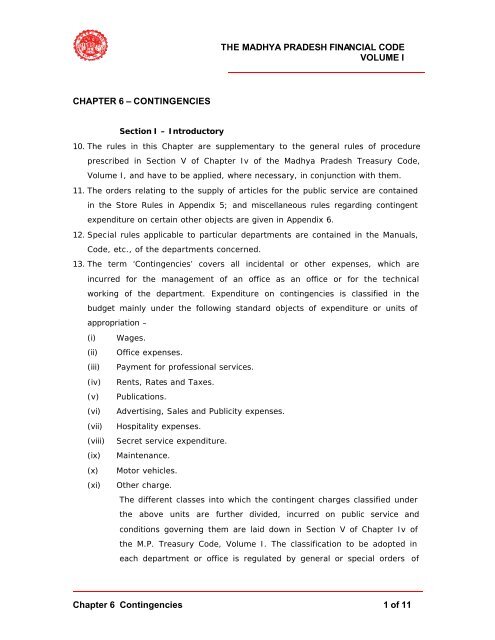
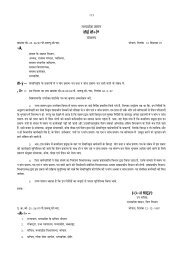
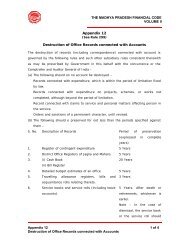
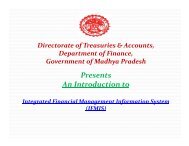
![Form M.P.F.C. 20 [See Rule 266 (4)] - Mptreasury.org](https://img.yumpu.com/50367893/1/190x146/form-mpfc-20-see-rule-266-4-mptreasuryorg.jpg?quality=85)
